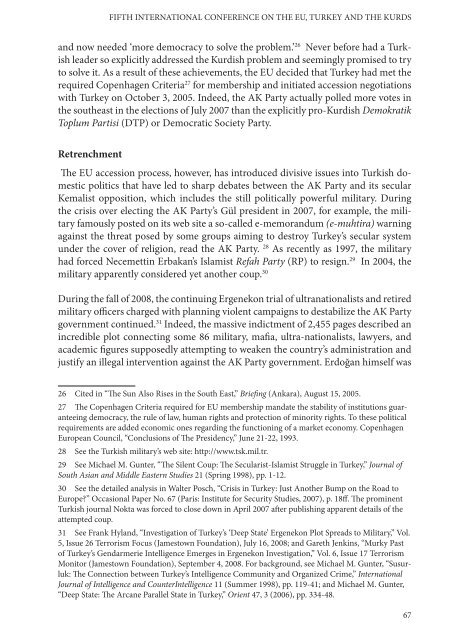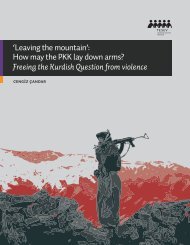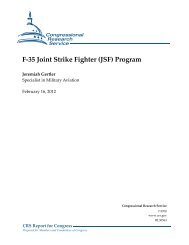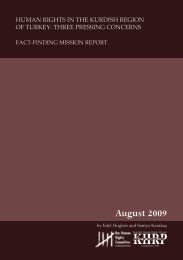FIFTH INTERNATIONAL CONFERENCE ON THE EU TURKEY AND THE KURDS
fifth international conference on the eu, turkey and the kurds
fifth international conference on the eu, turkey and the kurds
You also want an ePaper? Increase the reach of your titles
YUMPU automatically turns print PDFs into web optimized ePapers that Google loves.
<strong>FIFTH</strong> <strong>INTERNATI<strong>ON</strong>AL</strong> <strong>C<strong>ON</strong>FERENCE</strong> <strong>ON</strong> <strong>THE</strong> <strong>EU</strong>, <strong>TURKEY</strong> <strong>AND</strong> <strong>THE</strong> <strong>KURDS</strong><br />
and now needed ‘more democracy to solve the problem.’ 26 Never before had a Turkish<br />
leader so explicitly addressed the Kurdish problem and seemingly promised to try<br />
to solve it. As a result of these achievements, the <strong>EU</strong> decided that Turkey had met the<br />
required Copenhagen Criteria 27 for membership and initiated accession negotiations<br />
with Turkey on October 3, 2005. Indeed, the AK Party actually polled more votes in<br />
the southeast in the elections of July 2007 than the explicitly pro-Kurdish Demokratik<br />
Toplum Partisi (DTP) or Democratic Society Party.<br />
Retrenchment<br />
The <strong>EU</strong> accession process, however, has introduced divisive issues into Turkish domestic<br />
politics that have led to sharp debates between the AK Party and its secular<br />
Kemalist opposition, which includes the still politically powerful military. During<br />
the crisis over electing the AK Party’s Gül president in 2007, for example, the military<br />
famously posted on its web site a so-called e-memorandum (e-muhtira) warning<br />
against the threat posed by some groups aiming to destroy Turkey’s secular system<br />
under the cover of religion, read the AK Party. 28 As recently as 1997, the military<br />
had forced Necemettin Erbakan’s Islamist Refah Party (RP) to resign. 29 In 2004, the<br />
military apparently considered yet another coup. 30<br />
During the fall of 2008, the continuing Ergenekon trial of ultranationalists and retired<br />
military officers charged with planning violent campaigns to destabilize the AK Party<br />
government continued. 31 Indeed, the massive indictment of 2,455 pages described an<br />
incredible plot connecting some 86 military, mafia, ultra-nationalists, lawyers, and<br />
academic figures supposedly attempting to weaken the country’s administration and<br />
justify an illegal intervention against the AK Party government. Erdoğan himself was<br />
26 Cited in “The Sun Also Rises in the South East,” Briefing (Ankara), August 15, 2005.<br />
27 The Copenhagen Criteria required for <strong>EU</strong> membership mandate the stability of institutions guaranteeing<br />
democracy, the rule of law, human rights and protection of minority rights. To these political<br />
requirements are added economic ones regarding the functioning of a market economy. Copenhagen<br />
European Council, “Conclusions of The Presidency,” June 21-22, 1993.<br />
28 See the Turkish military’s web site: http://www.tsk.mil.tr.<br />
29 See Michael M. Gunter, “The Silent Coup: The Secularist-Islamist Struggle in Turkey,” Journal of<br />
South Asian and Middle Eastern Studies 21 (Spring 1998), pp. 1-12.<br />
30 See the detailed analysis in Walter Posch, “Crisis in Turkey: Just Another Bump on the Road to<br />
Europe?” Occasional Paper No. 67 (Paris: Institute for Security Studies, 2007), p. 18ff. The prominent<br />
Turkish journal Nokta was forced to close down in April 2007 after publishing apparent details of the<br />
attempted coup.<br />
31 See Frank Hyland, “Investigation of Turkey’s ‘Deep State’ Ergenekon Plot Spreads to Military,” Vol.<br />
5, Issue 26 Terrorism Focus (Jamestown Foundation), July 16, 2008; and Gareth Jenkins, “Murky Past<br />
of Turkey’s Gendarmerie Intelligence Emerges in Ergenekon Investigation,” Vol. 6, Issue 17 Terrorism<br />
Monitor (Jamestown Foundation), September 4, 2008. For background, see Michael M. Gunter, “Susurluk:<br />
The Connection between Turkey’s Intelligence Community and Organized Crime,” International<br />
Journal of Intelligence and CounterIntelligence 11 (Summer 1998), pp. 119-41; and Michael M. Gunter,<br />
“Deep State: The Arcane Parallel State in Turkey,” Orient 47, 3 (2006), pp. 334-48.<br />
67





